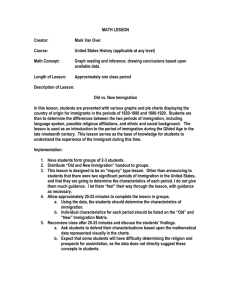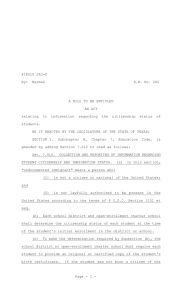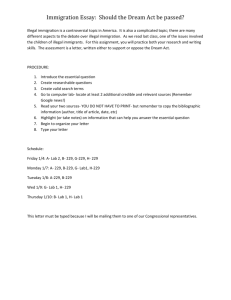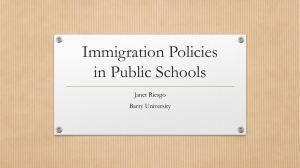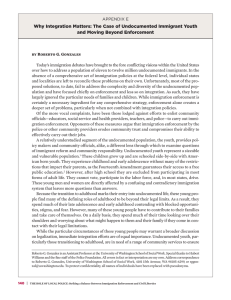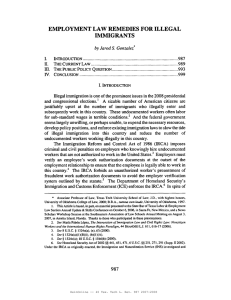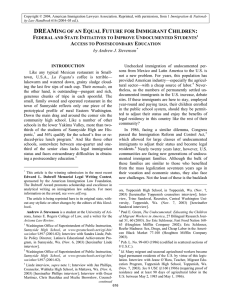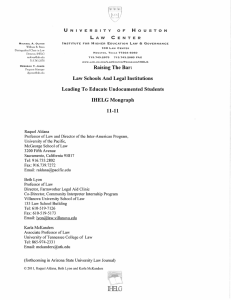Deborah Holbrook's Borderlands Reflection
advertisement
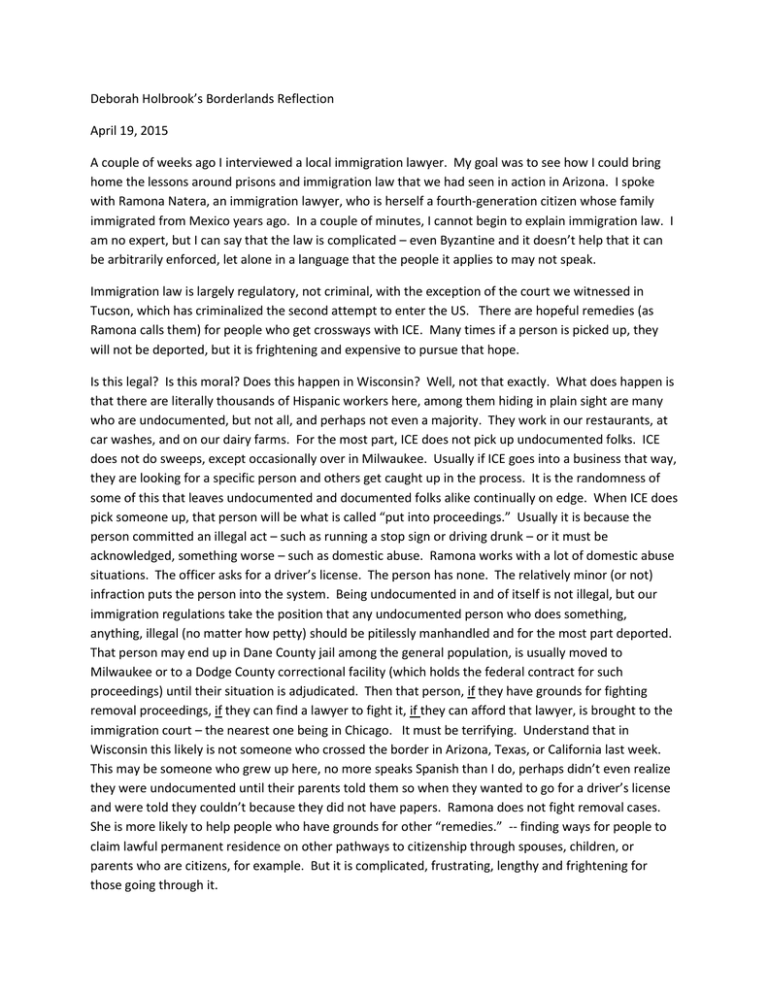
Deborah Holbrook’s Borderlands Reflection April 19, 2015 A couple of weeks ago I interviewed a local immigration lawyer. My goal was to see how I could bring home the lessons around prisons and immigration law that we had seen in action in Arizona. I spoke with Ramona Natera, an immigration lawyer, who is herself a fourth-generation citizen whose family immigrated from Mexico years ago. In a couple of minutes, I cannot begin to explain immigration law. I am no expert, but I can say that the law is complicated – even Byzantine and it doesn’t help that it can be arbitrarily enforced, let alone in a language that the people it applies to may not speak. Immigration law is largely regulatory, not criminal, with the exception of the court we witnessed in Tucson, which has criminalized the second attempt to enter the US. There are hopeful remedies (as Ramona calls them) for people who get crossways with ICE. Many times if a person is picked up, they will not be deported, but it is frightening and expensive to pursue that hope. Is this legal? Is this moral? Does this happen in Wisconsin? Well, not that exactly. What does happen is that there are literally thousands of Hispanic workers here, among them hiding in plain sight are many who are undocumented, but not all, and perhaps not even a majority. They work in our restaurants, at car washes, and on our dairy farms. For the most part, ICE does not pick up undocumented folks. ICE does not do sweeps, except occasionally over in Milwaukee. Usually if ICE goes into a business that way, they are looking for a specific person and others get caught up in the process. It is the randomness of some of this that leaves undocumented and documented folks alike continually on edge. When ICE does pick someone up, that person will be what is called “put into proceedings.” Usually it is because the person committed an illegal act – such as running a stop sign or driving drunk – or it must be acknowledged, something worse – such as domestic abuse. Ramona works with a lot of domestic abuse situations. The officer asks for a driver’s license. The person has none. The relatively minor (or not) infraction puts the person into the system. Being undocumented in and of itself is not illegal, but our immigration regulations take the position that any undocumented person who does something, anything, illegal (no matter how petty) should be pitilessly manhandled and for the most part deported. That person may end up in Dane County jail among the general population, is usually moved to Milwaukee or to a Dodge County correctional facility (which holds the federal contract for such proceedings) until their situation is adjudicated. Then that person, if they have grounds for fighting removal proceedings, if they can find a lawyer to fight it, if they can afford that lawyer, is brought to the immigration court – the nearest one being in Chicago. It must be terrifying. Understand that in Wisconsin this likely is not someone who crossed the border in Arizona, Texas, or California last week. This may be someone who grew up here, no more speaks Spanish than I do, perhaps didn’t even realize they were undocumented until their parents told them so when they wanted to go for a driver’s license and were told they couldn’t because they did not have papers. Ramona does not fight removal cases. She is more likely to help people who have grounds for other “remedies.” -- finding ways for people to claim lawful permanent residence on other pathways to citizenship through spouses, children, or parents who are citizens, for example. But it is complicated, frustrating, lengthy and frightening for those going through it. I believe someone asked last week, “What do we do? Just let everyone in?” One might speculate what Jesus would say to that, but I do think there is a longer answer, some larger and systemic and a few smaller, more personal and local? 1. 2. 3. 4. Require that our immigration laws not be arbitrarily enforced. Revise immigration law so that it does not reflect racism or anti-ethnicities. Enforce open record law around enforcement agencies such as the Border Patrol. Expand the qualifying situations for asylum to include economic privation and persecution by corrupt police/military. 5. Take responsibility for creating the immigration flood through revision of our drug laws. 6. Acknowledge that NAFTA has been a disaster for Mexico and Central America and attempt to shore up these economies. 7. Do what is in our power to support legitimate governments, especially in Mexico. These systemic changes depend on the will of the Congress and the executive branch. So we as citizens can lean on them. There are some things locally as well. Don’t assume the status of a Hispanic-looking person – they may or may not have documents. Give money for someone to fight the costs of their removal proceedings. A few hundred dollars can make a big difference to an individual. Can you say Compassion Offering? Go down to First Presbyterian and provide a friendly face to those who come in seeking legal advice. And so forth. So how was I personally changed by this trip to the border? Over the last several years, I have wanted to have what I will call a “transcendent experience.” I have participated in retreats, I have looked at sunsets, I have prayed, I have meditated, I have tried to open my heart and invite God in. Frankly, all this earnest effort has not given me quite the “result” I have wanted, a sense of the presence of God that irradiates my brain and heart with utter conviction. The closest I have come has been my work in healthcare. That has provided me with a bone-deep sense that some things are worth doing and that I can find the face of God in the individuals I encounter there. This trip to Tucson has also allowed me look into the eyes of immigrants the same way. As long as I am concerned with my own soul, I will lose it. Indeed, I believe Jesus said something like that. I cannot compartmentalize my religious life into meditation/contemplation vs. social justice. For me, Jesus’ message was to become (not brain washed) but “heart washed” with the message that the Powers That Be, the ones who benefit from my fears and isolation (sometimes ironically and paradoxically including myself) are the ones I must fight. These people who want to cross our border at tremendous personal peril and suffering are not the enemy. They are fleeing drug cartels which conscript sons and rape daughters. They are coming across because subsistence farming is no long subsistence and governments cannot protect them. The enemy is economic domination that insists that one people, or even one person, can be exploited for my comfort. Ramona said that she is convinced that one of the reasons Social Security itself will survive is that so many undocumented pay social security taxes that they themselves will never be able to collect. But we are told: undocumented children are overwhelming the medical and educational systems. Well, no. It is once again a question of allocating resources, not that there aren’t enough resources to allocate. Data indicates that the effect of undocumented workers in the US is a net economic gain to the rest of us. We are all embedded in this system. So, what am I going to do? Not take my Social Security check? Of course, it makes me want to throw up my hands. But there is hope. It is the hope that many, many people are working on various pieces – drug policies, pro-bono immigration lawyers, Good Samaritans, Sanctuaries, and people here in Madison like Ramona and pro bono law students from the UW. At the southwest conference meeting a week ago Saturday, we learned of some great work in literacy and other supports in the Dodgeville/Platteville area. So here is how my trip to AZ affected me: That I must fight and struggle against systemic evil wherever I find it and no matter how it is presented to me. That I must be more and more educated about issues and become more and more clear-eyed about them. If God is going to show up in my life, it must be here at the heart of Jesus’ message; it must be political; it must be social. There is no other way for me to achieve any sense of personal salvation except through the salvation of others. This conviction is what our trip to AZ gave to me.



